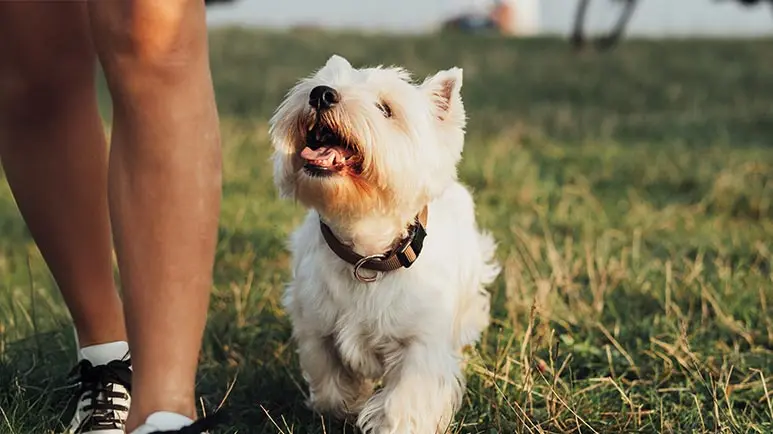Why Does Your Dog Follow You Around?
It's in your dog's genes to be your constant shadow, following you around nonstop. You probably also reinforce the behavior in your dog by giving her food, treats and belly rubs, which only makes her want to follow you around even more.

STORY AT-A-GLANCE
- Your dog may follow you around for the simple reason that you’ve reinforced this behavior by giving her food, water, treats and belly rubs
- All of these good things happen when she’s around you, thus reinforcing her decision to spend time by your side
- If your dog is part of the working or herding groups, such as border collies or Australian shepherds, she was bred to work alongside humans
- Dogs are often thoroughly bonded with their human owners and likely enjoy the companionship they get when they’re with you, just as you enjoy theirs
Editor's Note: This article is a reprint. It was originally published February 21, 2019.
Is your dog your trusty sidekick, following you from room to room and lying by your side whenever you're sitting down? This devoted companionship is one of dogs' most endearing traits, but why do they do it?
The most straightforward answer is simply because she wants to. Most dogs enjoy spending time with their human and would rather spend time near you than in a room alone across the house. There's more to it than this, however, as your dog may be wired to want to follow you around; it could very well be in your genes.
It May Be in Your Dog's Genes to Follow You Around
If your dog is part of the working or herding groups, such as border collies or Australian shepherds, she was bred to work alongside humans. As such, it's very natural for her to want to stay by your side. Erin Kramer, a professional certified dog trainer, told the American Kennel Club (AKC), "It's a trait that's prized and bred into their genetic history."1
Further, even if your dog isn't a working breed, dogs are pack animals, which means, in your home, you're part of the pack, and your dog wants to be close to its pack. If you've had your dog since she was a puppy, it's also possible that she imprinted on you. Guardian dogs, for instance, are introduced to livestock as puppies so they imprint on the flock, but a puppy in your home may imprint on you when she's between 3 and 16 weeks of age, which means she'll view you as her parent or a person she can trust.
You Give Positive Reinforcement
Your dog may also follow you around for the simple reason that you've reinforced this behavior by giving her food, water, treats and belly rubs. All of these good things happen when she's around you, thus reinforcing her decision to spend time by your side. The more positive things that happen to your dog when she's in your presence, the more likely she is to want to be with you.
Oftentimes, a dog may become fixated on one person in particular — typically whoever gives her the most attention or other benefits. This could be taking her for walks, feeding her or engaging her with play sessions. "Look at it from the dog's point of view," Kramer continued to AKC. "You might think you're the cool one, but the person your dog is attached to is the road to everything wonderful and magical. The focus is on that person because of what they give access to."2
A Mutually Beneficial Relationship
Research shows the bond between a person and a dog is similar to the bond experienced between an infant and his parents.3 Dogs are also masters at reading human faces and body postures, and are also capable of understanding what the expression means, emotionally.
Research published in Biology Letters also found dogs recognize both dog and human emotions.4 So dogs are often thoroughly bonded with their human owners and likely enjoy the companionship they get when they're with you, just as you enjoy theirs. Your dog is also likely watching your actions closely for clues about the day. Dr. Oscar E. Chavez, adjunct faculty member at Cal Poly Pomona University, told PetMD:5
"Given all the research to support a unique adaption to understand human gestures, language, and tone, it's no wonder that dogs often look like they are studying our movements …
They're watching our every move to see if we give them clues as to our intentions, or to catch us communicating with them. In this way they could anticipate that it's time for a walk, or see that you are getting ready to leave, or perhaps that it's dinnertime."
While your dog gains insights into how soon dinner is coming and a steady supply of scratches behind the ears, you'll also benefit from your dog's close presence. The physical presence of your dog next to you provides a source of companionship and comfort. Your dog's rhythmic breathing, soft fur and warm body all contribute to this soothing effect. Dogs can even provide health benefits like lower blood pressure and triglyceride levels, which supports heart health.6
Do You Have a 'Velcro Dog'?
While it's normal for your dog to want to spend more time with you than without, some dogs may be attached to you like glue, signaling a problem. Such "Velcro dogs," as they're known, could be struggling with separation anxiety that makes being apart from you frightening prospect.
She may also be unhealthily attached to only one person, perhaps because she wasn't properly socialized as a puppy, and could be at risk of developing fear-based aggression or other problem behaviors when exposed to strangers. If you suspect your dog is abnormally clingy, talk with your veterinarian, a positive dog trainer or a specialist in canine behavior. In most cases, however, your dog's desire to be with you is just another perk of pet ownership.











